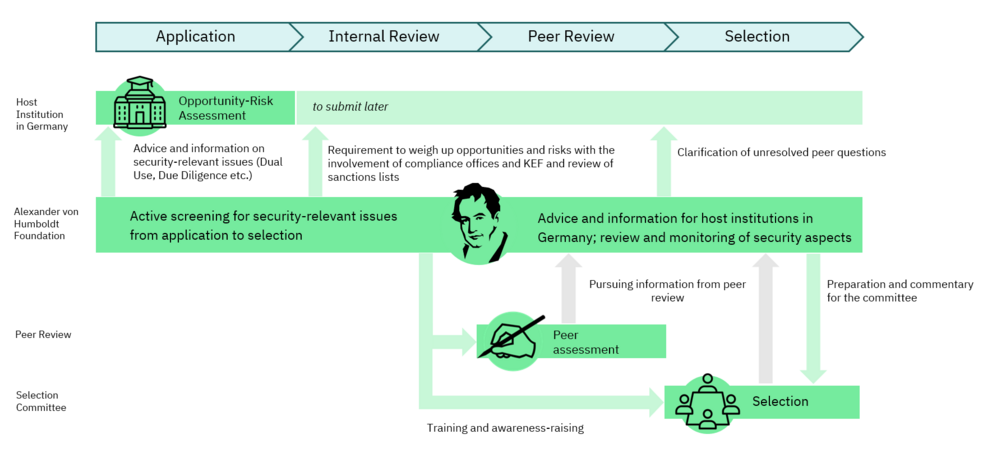Jump to the content
- {{#headlines}}
- {{title}} {{/headlines}}
Context and stance of the Humboldt Foundation
By promoting outstanding researchers, the Humboldt Foundation lays the cornerstone for international collaborations. Its sponsorship-recipients contribute to scientific progress and help to solve global problems. Collaborations amongst researchers who pursue joint scientific goals in a spirit of mutual respect can build bridges to other countries and cultures.
But international collaborations can also pose risks. The potential misuse of research results or knowledge gained during collaborations can affect all research fields. It is therefore necessary to assess the opportunities and risks involved in cooperation with researchers from countries which, due to their general constitutional and socio-political conditions, suggest a use of research knowledge that is contrary to the fundamental values of freedom and democracy. Giving consideration to the collaborative partners’ scientific and social context should be an inherent part of preparing joint research projects in order to address discrepancies or differing expectations at an early stage. Compliance with legal framework conditions, such as granting access to materials, equipment, software, etc. that are subject to authorisation under export control laws, should also be checked in advance. It is therefore advisable that everyone involved in international collaborations (e.g., hosts, nominators, scouts etc.) inform the Compliance Office at their own institutions in good time when initiating an international collaboration.
What is security-relevant research
In defining security-relevant research, the Alexander von Humboldt Foundation follows the guidelines issued by the Joint Committee on the Handling of Security-Relevant Research established by the DFG and Leopoldina. “Security-relevant research includes scientific work that has the potential to produce knowledge, products or technologies that can be misused by third parties to harm human dignity, life, health, freedom, property, the environment or peaceful coexistence. This is designated as ‘of concern’ if the misuse can be immediate and the potential damage is significant.”
In addition to technology transfer and the risk of proliferation, security-relevant research also includes emerging technologies, such as research into artificial intelligence, where it is difficult to assess the technological and ethical implications. In this context, the technology readiness level (TRL) can prove a valuable assessment tool in differentiating between pure basic research and technological research as well as between direct and indirect risks (see the Manual Export Control and Academia issued by the Federal Office for Economic Affairs and Export Control).
Guidelines for handling security-relevant research
The Alexander von Humboldt Foundation’s Board of Trustees passed the following guidelines on handling security-relevant research at its meeting in May 2023:
- The Alexander von Humboldt Foundation sponsors researchers irrespective of their discipline and nationality. As a matter of principle, all researchers, irrespective of their country of origin, are therefore eligible to apply to its programmes.
- On its website, the Humboldt Foundation provides additional information for German institutions hosting researchers from countries in which it is to be feared that research results could be misused. In the event of conflicts, host institutions as well as sponsorship recipients bear a high degree of responsibility, potentially even criminal responsibility.
- In the event of ethical or security-relevant concerns, the Humboldt Foundation reserves the right to forward applications it has received to the host institutions requesting them to consult the Ethics Committees and Compliance Offices at their institutions before a funding decision is made.
What does this mean in practice?
As an internationally active intermediary organisation, the Humboldt Foundation campaigns both for the freedom of research and the responsibility of research. It is fully aware of its special responsibility in the conscientious handling of security-relevant research. It supports the call by the German and European science organisations which states that, due to their special ethical responsibility, researchers should not just be satisfied with complying with legal regulations. The Foundation does not draw any red lines beyond what is legally required, neither in terms of topic nor institution but allows its selection committees to make their sponsorship decisions in each individual case based on external specialist review. The written documentation on security-relevant aspects in the review process constitutes proof, amongst others, for the German host institutions involved that the relevant care has been taken. If necessary, the Foundation will involve the universities’ and non-university institutions’ own structures in reviewing applications, e.g., the Ethics Committees for Security-Relevant Research (KEF) or the Compliance Offices. This dual-control principle is an important aspect of the Humboldt Foundation's risk assessment in the application process and during the period of sponsoring international cooperation.
What influence does this have on the Alexander von Humboldt Foundation’s selection process?

The Humboldt Foundation will devote more space to security relevance in its application procedure in order to sustainably reinforce the direct responsibility of science in handling security-relevant research.
- Before the application process begins and irrespective of the candidate’s country of origin and specialist area, the collaborative partners involved on the German side, such as hosts and nominators, should consider the security relevance of a research collaboration. Apart from the content of the research collaboration and the tools (equipment, software, materials etc.) that will be used, the previous affiliations of potential collaborative partners should also be examined.
- When submitting an application, any security-relevant aspects should be stated and subjected to an opportunity risk assessment in a form that is comprehensible to the scientific community. It should be made clear whether and, if so, why the expected benefit of the collaboration significantly outweighs the risks. Involving inhouse organs like the KEF during the application process and subsequent collaboration is very advantageous. Particularly for applications that do not involve a review process, such as the direct fellowship grants in the Henriette Herz Scouting Programme, the dual control principle is explicitly recommended.
Both the applicants and their potential hosts must on all accounts agree to comply with legal regulations. - In the course of the review process, the individuals in the science community (independent peer reviewers, committee members etc.) involved will be asked to evaluate the statement on security relevance with regard to the completeness of the risks identified and how they should be classified within the subject. If further questions arise, they will be forwarded confidentially by the Humboldt Foundation to the relevant individuals (potential hosts, nominators etc.) and the answers will subsequently be made available for re-evaluation.
- If there are still ethical or security-relevant concerns, the Humboldt Foundation reserves the right to request a statement from the relevant Ethics Committee (KEF) and to involve the host institution’s Compliance Office unless the host institutions have done so in advance.
- The committee will make its funding decisions on the basis of all the information at its disposal, weighing up the freedom of research and the responsibility of research in each individual case. Applications involving unresolved questions regarding security relevance cannot be approved and may have to be postponed to the next meeting. The Humboldt Foundation reserves the right to reject applications which include statements on security relevance that are not convincing.
The Humboldt Foundation has no influence on the issuing of visas by the Federal Foreign Office.
It remains to be seen whether the more intensive consideration of security relevance in the applications for research collaborations described above will have a positive effect on accelerating the issuing of visas.
Additional links
- Federal Office for Economic Affairs and Export Control: Export Control and Academia
- Joint Committee on the Handling of Security-Relevant Research with search engine for local KEF contacts
- Review and reflection steps recommended by the German Research Foundation for dealing with risks in international research collaborations
- Guide to academic cooperation under complex conditions by the DAAD’s Competence Center for International Academic Cooperation (in German only)
- OPERATE – an online tool that institutions can use to improve their assessments of opportunities and risks involved in research collaborations
Please note that the statements contained on this page are not legally binding.

